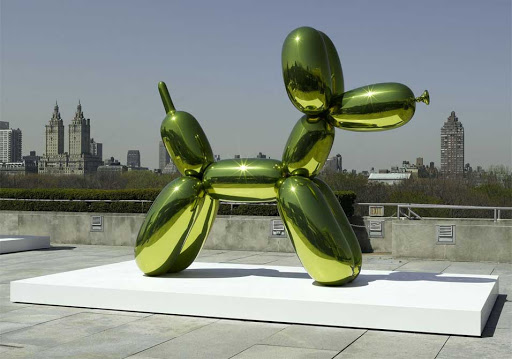
San Francisco gallery Park Life received a present from superstar artist Jeff Koons this Christmas: a cease-and-desist letter. The missive from Koons's lawyers ordered the space's art shop to stop selling and advertising a set of balloon-dog-themed bookends sold there, claiming that they violated the intellectual property of the artist's iconic sculpture "Balloon Dog."

Some, it is fair to say, have found this turn of events somewhat risible. "Wait, I'm confused, isn't his ENTIRE FUCKING CAREER based on co-opting other peoples work/objects?" reads a post on the gallery's blog from December 21. "So going forward, just so you know; Jeff Koons owns all likenesses of balloon dogs."
Co-owner Jamie Alexander had the bookends removed from Park Life's store to avoid a confrontation with the artist over the holidays. However, as of today, the site has an entry for the bookends in its "New in Stock" section, declaring "Back in Stock Soon. Much to the Dismay of Jeff Koons Lawyers. Call Us."
"We have been talking with the manufacturer and they're going to deal with it, not us," a gallery representative said. "We're not sure why Koons didn't go directly after the manufacturer in the first place."
The bookends, in fact, are manufactured by Toronto-based imm Living. They retail for $30, and are supposedly available in some 700 stores in the United States, according to an article on the dust-up in the Bay Citizen. The Park Life representative said that the original cease-and-desist letter demanded that the store hand over all remaining balloon dog merchandise to representatives of the artist.
Koons's giant-sized, highly finished "Balloon Dog" sculptures are some of his most well-known works. Versions have recently been seen on the rooftop of the Metropolitan Museum of Art, as well as in the inaugural show at the LACMA's Broad Contemporary Art Museum.

Park Life does sell various merchandise affiliated with artists, such as Tauba Auerbach playing cards and a Yoshitomo Nara "flip clock." And imm Living's bookend (available in orange and periwinkle) does clearly echo the Koons sculpture — though this itself echoes a conventional balloon dog of the kind commonly found at circuses and children's birthday parties.
However, the version sold at Park Life is made of painted resin, giving it a matte finish very different than the ultra-reflective surface of Koons' aluminum sculpture. Currently, imm Living's Web site advertises the item as "Big Top Bookend" ("Based on the classic art of balloon animal making, this Big Top Bookend is shaped like a top dog — but it won't pop or deflate!").

So, does Jeff Koons have the legal right to stop people from selling works that resemble balloon dogs? One relevant legal precedent may well be Blanch v. Koons, a 2006 case won by the artist himself that determined his appropriation of a copyrighted picture featuring women's legs for his work "Niagara" was protected under the United States's "fair use" statute. In that case, the court ruled that the key issue was whether the artist "had a genuine creative rationale for borrowing Blanch's image, rather than using it merely to get attention or to avoid the drudgery in working up something fresh." This time the courts will have to decide how fresh, really, a balloon dog can be.
From ArtInfo.


